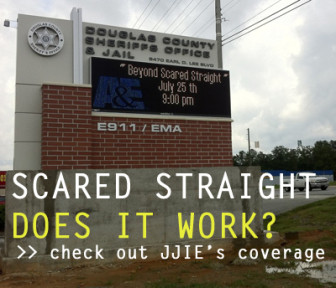 The American Jail Association has again voiced its opposition to A&E’s controversial “Beyond Scared Straight,” a reality television show that follows troubled teenagers as they are supposedly terrified out of their devious ways by rowdy prison inmates. Now in its fourth season, the show premiered to record viewership in 2011, bringing in more than 3.7 million viewers for A&E. It has remained a popular staple for the network, despite proof that scared straight programming is ineffective and often harmful to youth.
The American Jail Association has again voiced its opposition to A&E’s controversial “Beyond Scared Straight,” a reality television show that follows troubled teenagers as they are supposedly terrified out of their devious ways by rowdy prison inmates. Now in its fourth season, the show premiered to record viewership in 2011, bringing in more than 3.7 million viewers for A&E. It has remained a popular staple for the network, despite proof that scared straight programming is ineffective and often harmful to youth.
So why is this television show, one that glorifies the abuse of young people and the shameful dehumanization of some of the most marginalized Americans, still on the air? Especially given that the Office of Juvenile Justice and Delinquency Prevention, the federal agency for juvenile justice in the United States has formally stripped all scared straight programs of funding, and written in a scathing report that “Traumatizing at-risk kids is not the way to lead them away from crime and drugs.”
 To begin with, these programs mirror nicely the false, yet firmly held, belief that “tough on crime” approaches that emphasize punishment over prevention work best. More importantly, however, they ignore the fact that the ideas of punishment and fear on which our justice system are based are completely flawed.
To begin with, these programs mirror nicely the false, yet firmly held, belief that “tough on crime” approaches that emphasize punishment over prevention work best. More importantly, however, they ignore the fact that the ideas of punishment and fear on which our justice system are based are completely flawed.
The reality of scared straight programs is far from the pseudo reality of television. The truth about scared straight programs is that they are often interpreted as a challenge to troubled teens and as sport to inmates under pressure to behave like monsters, especially in front of cameras. What’s more, these shows put law enforcement at serious risk of liability. Nobody benefits from these encounters, and the volumes of evidence to that effect make it particularly startling that this television show remains on the air.
Consider some of the season 4 highlights listed on A&E’s website:
-
Returning inmate "Hustle Man", a ferocious incarcerated killer, is dragged away from the teens after he tries to attack.
-
12-year-old petty thief Alissa sobs uncontrollably at the sights and sounds of jail life, but, more shocking, her 14-year-old brother, himself having committed armed burglary and grand theft, refuses to comfort her amid the chaos.
-
An explosive giant, Joseph, assaults his little brother and his adoptive parents until he comes face-to-face with menacing convicts and deputies.
-
Aaron, a feisty habitual liar, initially confounds deputies by easily overcoming physical challenge during an exhausting all-night jail stay (returning fan favorite Richland County, SC) until deputies set their sights on getting inside his mind.
Do any of these highlights make this program sound anything other than abusive in nature? “Ferocious incarcerated killer,” “menacing convicts and deputies,” “deputies set their sights on getting inside his mind.” It’s our new coliseum. One could easily describe it as bullying.
And although bullying might be a fun way to get back at these “derailed, defiant, and disrespectful teens” as A&E calls them, it is hardly effective. In fact, a recent study by Dr. Michael G. Turner of the University of North Carolina – Charlotte found that young people who were victims of bullying had higher rates of illegal activity later in life; so rather than being scared into submission, they were motivated to defy authority and break the rules. The study recommended that intervention programs aimed at reducing involvement in crime and delinquency address bullying victimization as a risk factor – not include bullying as part of the program!
Parents and guardians desperate to get unruly teenagers in line may look to the programs depicted in this show as possible remedies, when in reality the programs do much more harm than good. It is high time that the truth about this show be heard loud and clear so that it may be taken off the air. Answers about what works best for troubled young people should be based in sound research, like Turner’s, not in storytelling aimed to generate profits for television networks. Our young people deserve better than that.
Paige Pihl Buckley grew up in Framingham, Massachusetts and currently lives in Boston’s Savin Hill neighborhood. She graduated magna cum laude from Boston University’s College of Communication in May 2012, receiving a Bachelor of Science in Print Journalism, with a minor in African studies. She was a four year Martin Luther King, Jr. Scholar, one of only twelve at Boston University, and was inducted into BU’s Scarlet Key Society her senior year. She began working as an intern for Strategies for Youth in September of 2011 and was hired full-time as Communications Coordinator upon her graduation from Boston University.

The answer to your question is simple, the show makes money. While these methods are ineffective at reform they are highly entertaining to a society that has been vilifying youth for decades. As long as the behavior is legal and profitable it will continue.